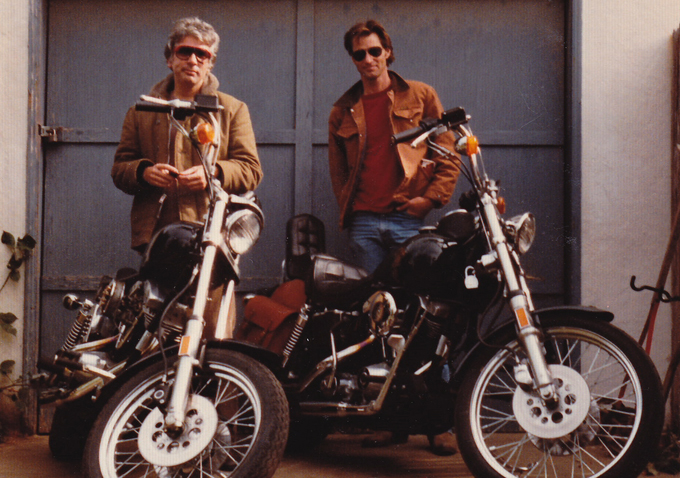
The thorny dynamics of heterosexual male friendship is a fascinating black hole that few narrative films ever bother looking into. Instead, most choose to focus on simplistic, superficial social maneuvering (or the all-important bromance) without ever investigating the knotty emotional undercurrents that course through every lengthy male friendship. One of the chief pleasures of “Shepard & Dark,” which concerns the relationship between Pulitzer Prize-winning playwright Sam Shepard and his buddy Johnny Dark, who now runs a deli counter at a New Mexico supermarket, is that you get to see all the wonderful, horrible, emotionally raw components that go into male friendship and how those can go from being solid building blocks to puddles of muck.

Johnny Dark met Sam Shepard in Greenwich Village in the early ‘60s, after one of Shepard’s plays (in which, according to Dark, he filled the small theater with smoke—something that current safety codes would never, ever allow, even for art). Dark was drawn in by the play’s content and found a welcoming friendship with Shepard, who was years away from becoming the angry darling of the theatrical world (much less the Academy Award-nominated star of Terrence Malick’s “Days of Heaven”). The two began a friendship primarily based on letter-writing; this epistolary relationship lasted, by their own estimation, for “nearly 50 years.”
As Treva Wurmfeld’s documentary begins, the two are reuniting in an effort to consolidate the massive sprawl of correspondence for an art exhibit and a book (the book, now finished and handsomely reproduced, is also out and quite good). This is something of a big deal, not the least of which because Shepard has long refused to write an autobiography, so the book of letters would serve as an unparalleled look into his innermost thoughts and feelings (the juicier anecdotes, of course, relating to his tumultuous, longtime relationship with Jessica Lange).

When the movie starts, it’s very clear that these men are living two wildly different lives: Shepard you would recognize from seeing him in “The Right Stuff” or from attending one of his plays; Dark is slinging coleslaw down at the local food shopper. But as you watch Shepard go visit Dark at work, you can tell that there is a closeness, that these men aren’t all that different, especially when you watch Shepard on the phone explaining the project mostly as a way “to make some bread,” something that never seems to even occur to Dark (even though they’d both walk away with half a million dollars, and Dark could use this money a whole lot more than Shepard).
As the movie continues, it delves into the ways in which they were connected: for years Dark was married to a woman whose daughter married Shepard. “We were related for 13 years,” Dark muses, noting that the two families lived together for many years until, in the early ‘80s, Shepard fell in love with Lange. Both men had complex, emotionally violent relationships with alcoholic and abusive fathers (unsurprising, given Shepard’s output), a subject that is further complicated by the fact that, when Shepard left to pursue his relationship with Lange, Dark was left to largely raise Shepard’s son. And both men have also been defined by their relationships with women: Dark’s wife of many years fell ill after suffering a brain aneurysm. Shepard left the family unit for Lange and, shortly before embarking on this project, quietly broke off his relationship with her.

Both men are fascinating, hangdog characters; each outlaws in their own way. Shepard would go on to produce plays of vitriolic outrage with deeply nuanced characters, while Dark—who, through the reading of his various letters, is often just as accomplished a writer as Shepard—would retreat inward, especially following his wife’s death. We watch as he lives his simple life, attended only by his dogs. At one point Shepard, in an interview, marvels at the level of hermetic loneliness Dark has accomplished, one without a single friend or acquaintance, and a lifestyle choice that ends up ultimately destroying their attempts at reconciling the material together.
There’s something both hilarious and sad about the men, and about their story, and about the way that they try to reconnect but can’t… quite… do it. There’s always been something romantic and powerful about relationships primarily built on letter-writing, and that’s true for Shepard and Dark too. Soon, though, the artistic ambitions of the project give way to petty jealousies and hurt feelings. The problem, of course, is that the movie lacks any kind of definitive resolution, and the filmmakers don’t exactly go out of their way to reassure the viewer that, yes, they did end up finishing the book and, yes, you can read it right now (it’s a corker). Instead, after all that effort being put into showing this relationship in its fullest terms, they allow the men to, true to their mythic southwestern surroundings, simply walk into the sunset, without so much as an envelope addressed “return to sender.” [B]

